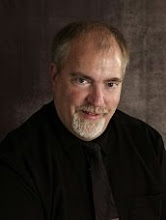Children of Eden
This summer, my sons performed in the Stephen Schwarz (Godspell, Hunchback of Notre Dame, Wicked) musical Children of Eden at the Tecumseh Civic Auditorium. Jeremiah had the role of Adam, and Zeke the role of Father (God). The show was loosely based on the first 9 chapters of Genesis, focusing mainly on Creation, the Fall, Cain and Abel, and the Flood. What could be wrong or objectionable about a musical based on the Bible, right?
For starters, the tree of the knowledge of good and evil was portrayed as simply the tree of knowledge, and God was portrayed as trying to keep his children in a state of perpetual childhood rather than allowing them to have answers to all their questions about what was "beyond" Eden. The "knowledge" Eve gained by eating the fruit was not the experiential knowledge of evil; instead, it was to imagine things like night vision goggles, flight, and harnessing water power for energy. There could be numerous examples where the love and grace of God, his forgiveness and restoration of sinners were nowhere to be found; instead, just a punitive, even racist "God" who would condemn a soul to die just for being of the "race of Cain."
One of the strangest scenes in the show is where Cain leaves home, defiantly wanting to search to find what lies beyond the waterfall, even though his father has forbidden it. Excited, Cain returns and leads his family to a ring of stones which resembles Stonehenge, and concludes that there are other people than the family of Adam, created by Father.
Why did the author concoct an obviously non-biblical fantasy? It is because in Genesis 4, after Cain murdered Abel, it is reported that Cain "lay with his wife and she became pregnant..." The question is, because there is no record of any other children of Eden, who was Cain's wife? Where did she come from? The conclusion is that there must have been other people, another tribe, from which Cain took his wife.
Critics who find the Bible to be a series of contradictions and inconsistencies will often point to that as an unanswerable difficulty. But, as
this reference points out, there is no difficulty at all. Simply because information is omitted doesn't mean that it didn't happen. It is illogical to conclude that Adam and Eve, having received the command to "Be fruitful and multiply; fill the earth..." would only have had the two children (and then Seth as the "replacement" for Abel). Genesis 5 does refer to Adam and Eve having "other sons and daughters."
Perhaps the greatest apparent contradiction in the Bible is that of God himself, who is at the same time a just God who hates and punishes sin and destroys the wicked, and a loving and merciful God who forgives the undeserving. This paradox is answered at the cross of Jesus, for there we see both God's punishment of sin and his forgivness of the sinner.
Have you found questions or things that puzzle you or with which you have been challenged? Post them in the comments section and let's see if we can help each other become better at apologetics.
Mr. Drews

